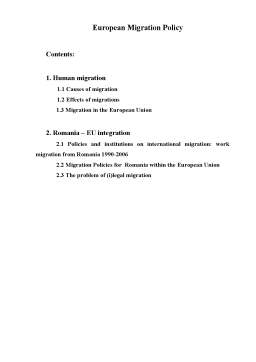Cuprins
- Contents:
- 1. Human migration
- 1.1 Causes of migration
- 1.2 Effects of migrations
- 1.3 Migration in the European Union
- 2. Romania – EU integration
- 2.1 Policies and institutions on international migration: work migration from Romania 1990-2006
- 2.2 Migration Policies for Romania within the European Union
- 2.3 The problem of (i)legal migration
Extras din referat
1.Human migration
Human migration denotes any movement by humans from one locality to another, often over long distances or in large groups. Humans are known to have migrated extensively throughout history and prehistory.
The movement of populations in modern times has continued under the form of both voluntary migration within one's region, country, or beyond, and involuntary migration (which includes slave trade, trafficking in human beings and ethnic cleansing). The people who migrate are called migrants, or, more specifically, emigrants, immigrants or settlers, depending on historical setting, circumstance and perspective.
1.1 Causes of migrations have modified over hundreds of years. Some cases are constant, some of them do not carry the same importance as years ago.
On the macro level, the causes of migration can be distilled into two main categories: security dimension of migration (natural disasters, conflicts, threats to individual safety, poor political prospects) and economic dimension of migration (poor economic situation, poor situation of national market).
Migration like any other process shapes many fields of life, having both advantages and disadvantages.
1.2 The effects of migrations are:
- changes in population distribution
- mixing of different cultures and races, which often leads to negative social behaviors – tensions in society between majorities and minorities, followed often by local struggles and racism and racial discrimination. Also criminality growth can be caused. But effects in different societies can be different. It is possible also some positive cultural effects of migration, for example exchange of cultural experience, new knowledge.
- demographic consequences: since migration is selective of particular age groups, migrants are mostly young and in productive age. It can cause a demographic crisis – population ageing, what in turn can be followed by economic problems (shrinking group of economically active population has to finance extending group of inactive population).
- economic results, which are of the greatest importance for the development of the countries.
1.3 Migration in the European Union
Migration issues are at the top of the European Union’s policy agenda. The high numbers of desperate boat people from Africa landing on the shores of Southern Europe have shocked European societies. In the first ten months of 2006, over 27,000 migrants landed on the shores of the Canary Islands and almost 17,000 on the island of Lampedusa. The increasing arrivals of people from different less developed areas seeking shelter and work have put particular emphasis on the fact that migration is a transnational phenomenon which calls for transnational answers. Consequently enough, the EU considers migration to be one of the most visible challenges of globalisation. In recent years the European Union and its member states have taken important steps to building up a legislative framework for managing immigration flows. Three directives were adopted for the admission of researchers and students originating from third countries:
The European Commission’s Policy Plan on Legal Migration published in December 2005 further proposed four directives for the management of entry and residence of highly skilled workers, seasonal workers, intra-corporate transferees and remunerated trainees respectively. With the Communication on a Common Agenda for Integration, the Commission also put forward a framework for the integration of third-country nationals into the EU and a directive was adopted concerning the status of third-country nationals who are long-term residents. Finally, the Commission’s Communication on Migration and Development highlighted the importance of enhancing collaboration with migrant sending countries on economic migration and developing initiatives offering win-win-win opportunities to countries of origin and destination and to labour migrants.
Just recently, EU Justice and Home Affairs ministers have outlined proposals for a more effective management of migration flows as well as for better prevention of illegal immigration.
At the informal ministerial meeting in Tampere in September 2006 they stressed the need for a common European asylum system and for more efficient border controls. However, this was the first step. Others were following. They strived for a comprehensive and coherent European Migration Policy (EMP) which adequately addresses both the opportunities and the problems of migration in a globalised world.
The next step on the way to a comprehensive and consistent EMP was an increased coherence between the EU’s various policies related to migration. EMP combines social, economic, security and development issues.
2. Romania – EU integration
Since the Romanian Revolution of 1989, European Union (EU) membership has been the main goal of every Romanian Government and practically every political party in Romania. Romania signed its Europe Agreement in 1993 and submitted its official application for membership in the EU in 1995, the third of the post-Cold War Eastern European countries to do so after Hungary and Poland. Along with its official EU application, Romania submitted the “Snagov Declaration”, signed by all fourteen major political parties declaring their full support for EU membership.
During the 2000s, Romania implemented a number of reforms in order to prepare for EU accession, including the consolidation of its democratic systems, the institution of the rule of law, the acknowledgement of respect for human rights, the commitment to personal freedom of expression, and the implementation of a functioning free-market economy.
Preview document
Conținut arhivă zip
- European Migration Policy.doc


















